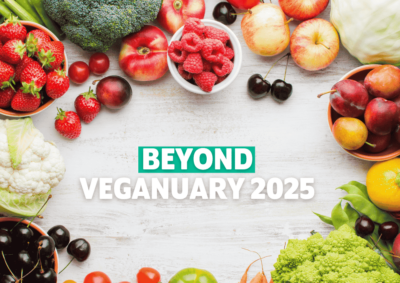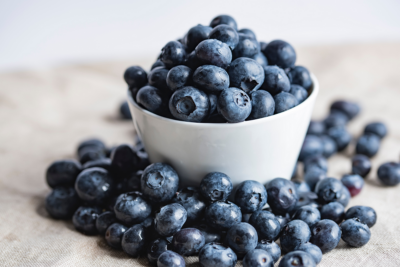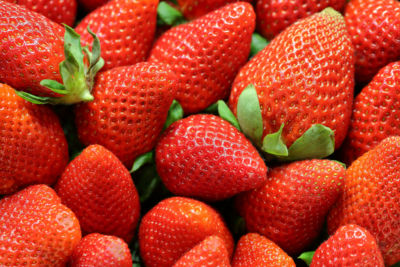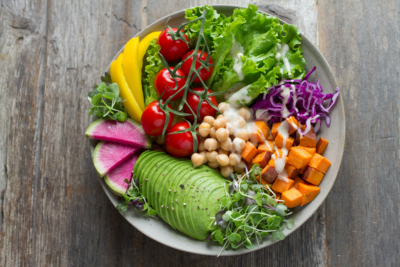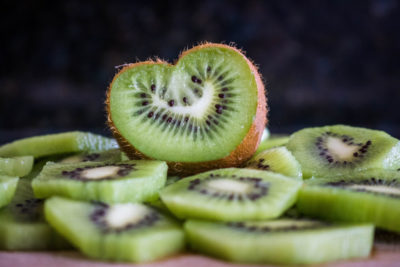Can a vegan diet help with high blood pressure? We’ll explain it all below.

Nearly 50 percent of adults in the US population have hypertension. Many studies show that vegetarians and vegans, in particular, have lower blood pressure than meat-eaters.
High blood pressure is a significant risk factor for heart disease, strokes, and kidney failure. As with diabetes, it’s often referred to as a “ticking time bomb.” According to the World Health Organization, hypertension is a major cause of premature death worldwide.
WHAT CAUSES HIGH BLOOD PRESSURE?
Often, but not always, high blood pressure is a result of our diet and lifestyle. Eating too much saturated fat – the kind found in meat, cheese, and many processed foods – raises the cholesterol in the blood. If there is too much cholesterol, it builds up inside the walls of our arteries, making them narrower, and raising the pressure of the blood as it flows through them.
Other causes include eating too much salt, not exercising, and smoking.
RISKS OF HIGH BLOOD PRESSURE
High blood pressure puts extra strain on the blood vessels, heart, and other organs including the brain, kidneys, and eyes.
Persistent high blood pressure can increase the risks of several potentially life-threatening conditions, such as heart disease, heart attacks, strokes, kidney disease, and vascular dementia.
what does research say about high blood pressure?
So, can a vegan diet help with high blood pressure? Research consistently shows that a diet free from animal products can be hugely beneficial.
- A 2017 paper examined the evidence for a plant-based diet and hypertension management. It concluded “that consuming a diet that is mostly or exclusively plant-based appears prudent for the prevention and treatment of hypertension.” (1)
- The Journal of Clinical Cardiology in March 2018 published the results of a trial in which patients were put on a plant-based diet that excluded all animal products for 4 weeks. They observed a significant reduction in blood pressure, as well as a reduction in cholesterol and other markers of cardiovascular disease. (2)
- In 2014, a meta-analysis published in the Journal of the American Medical Association showed that “Consumption of vegetarian diets is associated with lower BP. Such diets could be a useful nonpharmacologic means for reducing BP.” (A meta-analysis uses a statistical approach to combine the results from multiple studies.)
- In 2012, a cross-sectional study in Public Health Nutrition compared the blood pressure of non-vegetarians, semi-vegetarians, pescatarians, and vegans. The results showed that vegans had the lowest risk for high blood pressure. It also showed that for each step in diet change, reducing animal products eventually to zero (vegan) resulted in a lower risk for high blood pressure.
- In November 2016, The Academy of Nutrition and Dietetics, the world’s largest organization of nutrition professionals, posted its stance on vegetarian and vegan diets. It concluded that:
“It is the position of the Academy of Nutrition and Dietetics that appropriately planned vegetarian, including vegan, diets are healthful, nutritionally adequate, and may provide health benefits for the prevention and treatment of certain diseases. These diets are appropriate for all stages of the life cycle, including pregnancy, lactation, infancy, childhood, adolescence, older adulthood, and for athletes. Plant-based diets are more environmentally sustainable than diets rich in animal products because they use fewer natural resources and are associated with much less environmental damage.
Vegetarians and vegans are at reduced risk of certain health conditions, including ischemic heart disease, type 2 diabetes, hypertension, certain types of cancer, and obesity. Low intake of saturated fat and high intakes of vegetables, fruits, whole grains, legumes, soy products, nuts, and seeds (all rich in fiber and phytochemicals) are characteristics of vegetarian and vegan diets that produce lower total and low-density lipoprotein cholesterol levels and better serum glucose control. These factors contribute to reduction of chronic disease. Vegans need reliable sources of vitamin B-12, such as fortified foods or supplements.”
NOT ALL VEGAN DIETS ARE EQUAL
A 2020 study of 4,680 people across four countries found that healthy vegan diets that were rich in vegetables and whole grains were indeed beneficial for our blood pressure.
However, an unhealthy vegan diet can actually raise our blood pressure. The researchers concluded: “The nutritional quality of consumed plant foods is as important as limiting animal-based components.”
Sources:
- Alexander S, Ostfeld RJ, Allen K, Williams KA. A plant-based diet and hypertension. Journal of Geriatric Cardiology : JGC. 2017;14(5):327-330. doi:10.11909/j.issn.1671-5411.2017.05.014.
- Najjar RS, Moore CE, Montgomery BD. A defined, plant‐based diet utilized in an outpatient cardiovascular clinic effectively treats hypercholesterolemia and hypertension and reduces medications. Clin Cardiol. 2018;41:307–313. https://doi.org/10.1002/clc.22863
This page was reviewed by Claire Lynch, RD and nutritionist Rohini Bajekal from Plant-Based Health Professionals in November 2023.
PAGE UPDATED NOVEMBER 2024

